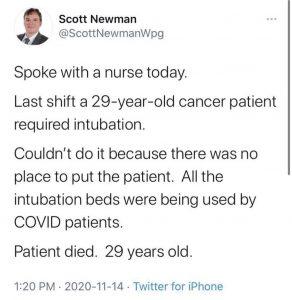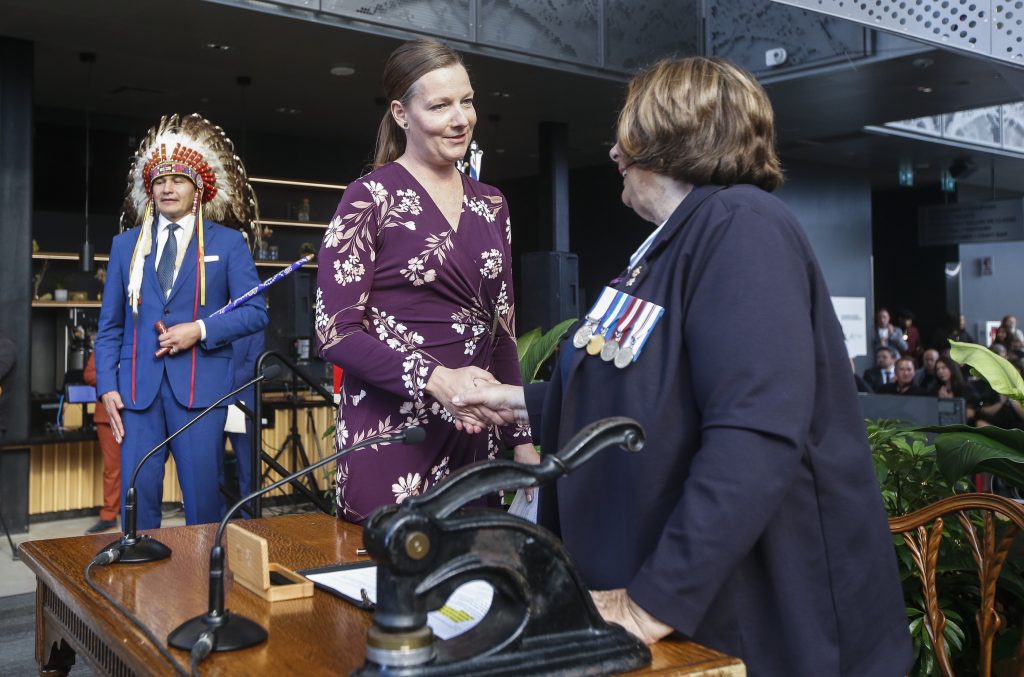Deleted tweet about cancer patient sparks conversation about battling misinformation
Posted November 16, 2020 4:55 pm.
Last Updated November 16, 2020 6:42 pm.
WINNIPEG – Distinguishing what’s real and what’s not–the United Nations is calling “misinformation” the new enemy.
Not only are we battling COVID-19, but there’s also a communication crisis of inaccurate information flooding our social networks.
A recent example of this happened in Winnipeg over the weekend.
On Saturday, a tweet from a local criminal defence lawyer stated a cancer patient required intubation but there was nowhere for this patient to be treated since all of the beds were being used by COVID-19 patients.
The patient died as a result.

A tweet from a Winnipeg lawyer was widely shared–but the tweet was not factual. (CREDIT: Screenshot taken from Twitter)
The tweet was shared thousands of times—but the information in the post wasn’t factual.
The patient being referenced was 29-year-old Taylor Dibley.
Dibley passed away, however, it had nothing to do with ICUs being over-capacity, or complications related to COVID-19, according to a family friend who asked to stay anonymous.
The friend shared an additional post with CityNews, which is now circulating at the request of Dibley’s family, appealing for the post to be taken down and for the public to know it’s false.
“One of the things that I think is really important right now is to fact check everything that you are reading and to find out what the original source was for that information,” said Susie Erjavec Parker, a communications strategist.
Parker says it’s very important to look at your social media feed critically.
Is this information in a written text? Is it a screenshot? Is it a meme? And, most importantly, if you can’t confidently identify the information as credible you should take a breath and wait a moment before rushing to share it online.
“We have someone who lost their sister, their mother, their cousin, and now they are dealing with misinformation being shared about her death and the nature of that. That’s very painful on top of what’s already a very painful and stressful time for them.”
“Many of us rely on social media for our information. It’s always in our face, it pops up and it catches our attention,” said epidemiologist Cynthia Carr.
Carr says fiction often circulates faster than fact online, especially in this pandemic.
She says the inaccuracy of this tweet is troubling, however, misinformation being shared suggesting COVID-19 being fake, the pandemic is a political ploy, or anti-mask messages suggesting kids are passing out from lack of oxygen, is far more troubling when it’s passed off as fact.
“So, if we share information that says ‘don’t wear a mask you’re going to suffocate’, ‘you’re going to hurt your child by wearing a mask’–again if there were hordes of people fainting or worse from wearing masks, it would already be a headline,” said Carr.
CityNews reached out to the person who was behind the original tweet, he did not respond, however has since posted an apology to the family and deleted the original tweet.
We also reached out to the Manitoba Nurses Union which said it can not comment on a specific patient case, but is sending condolences to the family.








